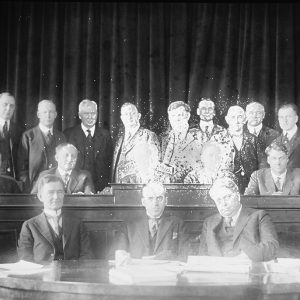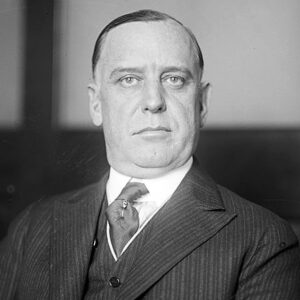calsfoundation@cals.org
Henderson Madison Jacoway (1870–1947)
Henderson Madison Jacoway was an Arkansas politician who represented the state’s Fifth District in Congress for six terms. First elected to the Sixty-Second Congress, he served from March 4, 1911, until March 3, 1923.
Henderson Jacoway was born in Dardanelle (Yell County) on November 7, 1870, to William Dodge Jacoway and Elizabeth D. Parks Jacoway. Jacoway attended the local common schools before graduating from Dardanelle High School in 1887. He went on to Winchester Normal College in Winchester, Tennessee, earning his degree in 1892. He then entered Vanderbilt University’s law department, where he completed his degree in 1898, graduating as valedictorian. He was admitted to the bar the same year and started a private practice in Dardanelle.
In 1893, Congress created the Commission to the Five Civilized Tribes (also called the Dawes Commission after its first chairman, Henry L. Dawes). The commission was tasked with reorganizing the Indian Territory by getting major tribal leaders to agree to a plan that would end tribal land titles and instead distribute the land among individuals. Jacoway was selected to serve as the secretary of the commission, a post he held until President William McKinley assumed office in early 1897.
Jacoway returned to Arkansas and his private practice. A few years later, he became secretary to Charles C. Reid, who was elected to serve in the House of Representatives in 1900. Jacoway served Reid in that capacity for two terms before again returning to Arkansas, this time to serve as prosecuting attorney for the Fifth Judicial District from 1904 until 1908, when he again returned to his private practice. On September 10, 1907, he married Margaret Helena Cooper; the couple had a son and a daughter.
Jacoway served as a member of the State Democratic Central Committee from 1910 until 1912, a period that overlapped with his first term in the U.S. House of Representatives. When Reid retired in 1910, party leaders turned to Jacoway, who accepted the opportunity to succeed his mentor. He easily won the general election with over seventy-five percent of the vote.
As a member of Congress, Jacoway was a diligent protector of the agricultural interests that were central to the state’s economy. While his freshman committee assignments included Elections, Indian Affairs, and Invalid Pensions, he was also a member of the Agriculture Committee. The Agriculture Committee eventually became his sole committee responsibility, which allowed him to exercise considerable influence in that area. By his final term, Jacoway had risen to ranking minority member, a position from which he consistently sought to further the state’s important farming interests.
Jacoway’s first term also included a high-profile assignment as a member of the Special Committee to Investigate the American Sugar Refining Company (the Sugar Trust). The work of this and other committees reflected the growing concern about trusts, a concern that would be validated when the Sixty-Third Congress enacted the Clayton Anti-Trust Act. In addition, he secured expanded rural free mail delivery, as well as more roads and better-developed rivers in the heavily rural state. Jacoway also pushed for expanded rights for organized labor as well as greater educational aid to agricultural schools.
After twelve years on Capitol Hill, Jacoway chose not to run for reelection in 1922. Upon the completion of his term in March 1923, he returned to Arkansas, where he settled in Little Rock (Pulaski County) with his family. He resumed the practice of law, and he also served as vice president of the People’s Savings Bank from 1923 until 1929. He stayed involved in public affairs, serving from 1936 until 1945 as regional counsel for the newly established Social Security Board for the states of Arkansas, Missouri, Oklahoma, and Kansas.
Jacoway died in Little Rock on August 4, 1947. He is interred in Roselawn Cemetery in Little Rock.
For additional information:
“Former Congressman Jacoway Dies.” Arkansas Gazette, August 8, 1947, p. 10.
Hempstead, Fay. Historical Review of Arkansas: Its Commercial, Industry and Modern Affairs. Vol. 3. Greenville, SC: Southern Historical Press, 1977.
“Henderson Madison Jacoway.” Biographical Directory of the United States Congress. http://bioguide.congress.gov/scripts/biodisplay.pl?index=J000041 (accessed September 1, 2021).
William H. Pruden III
Ravenscroft School
 Early Twentieth Century, 1901 through 1940
Early Twentieth Century, 1901 through 1940 Politics and Government
Politics and Government Agricultural Committee
Agricultural Committee  Henderson M. Jacoway
Henderson M. Jacoway 




Comments
No comments on this entry yet.